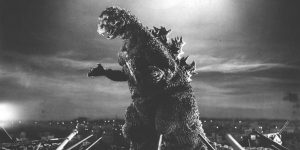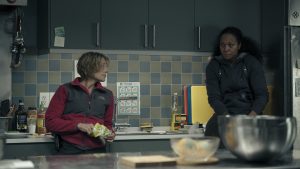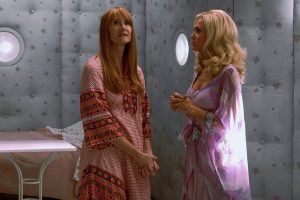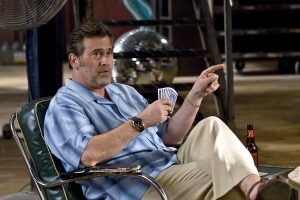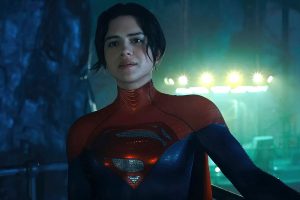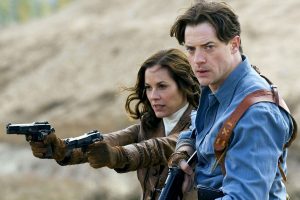
This article contains spoilers for The Sopranos series finale.
When TV fans bring up The Sopranos in casual conversation, often the first thing they say is “And what did you think of that ending!?” The cut to black as the Soprano clan eats onion rings and viewers are treated to Journey’s “Don’t Stop Believin’” makes it hard to remember anything else that happens in the final episode “Made in America.” The legacy of the climax deserves all of the hype it gets. Series creator David Chase and his writing team set out to conclude the show in a way that would allow for open-ended discussion in perpetuity, but this ended up being a double-edged sword.
As brilliant as The Sopranos’ final scene is, those final five minutes in the diner with Tony (James Gandolfini), Carmela (Edie Falco), and A.J. (Robert Iler) aren’t quite as quintessential to the essence of the series as the scene right before it. What clip am I talking about? Unless you’re a superfan, you might not even remember.
Before Tony heads to Holsten’s to wait for his wife and kids to enjoy what is most likely his last supper, he makes a pit stop to reminisce about the good old days with Corrado Soprano a.k.a his Uncle Junior (Dominic Chianese). Dialogue was always the strongest suit in the series, and these three minutes shared by Tony and his frenemy crime boss capture the entire thematic heft of The Sopranos’ literary vitality.
Tony and Uncle Junior shared a rocky relationship, to say the least. From Junior plotting with Livia (Nancy Marchand) to kill Tony in the earliest episodes to him shooting his nephew toward the end, the state of their partnership was complex, juicy, and almost always poignant. These are two men who loved and respected each other in their own twisted, mafia-machismo way, but a tinge of jealousy and betrayal always dragged them down. The family game was more important than the family name, that is until Junior’s dementia and elderly decline were able to strip away the superficiality and reveal the authenticity lurking behind the curtain.
Tony wants to talk specifics about who will inherit Junior’s money after Bobby Bacala (Steve Schirripa) is murdered in “Blue Comet.” To his surprise, Junior stares blankly into the distance, barely understanding who Tony is and especially not grappling with the significance of any financial issues within the crime family. “What, you don’t recognize me?” Tony sarcastically tests Junior’s memory, to which his uncle says, “We used to play catch.” This line is so sharp, and so powerful, that it’s hard to put into words how much credit the scriptwriters deserve here.
Tony tells his kids to remember the good times in life back in season 1, a statement that A.J. immediately brings up to his father once again at the restaurant just a few minutes after this scene. When Tony wants Junior to recall mobster turmoil and family politics, the only thing his lost brain can find is a moment of innocence. As much as the Soprano family wants to act high and mighty, they’re just like any other kin unit in America. This fleeting image in Junior’s head of a simple time between a nephew and an uncle, throwing a baseball in the backyard, reveals the affection that existed before it was killed by the business.
Tony ignores the positive memory and again attempts for Junior to identify his mobster past. “You and my dad, you guys ran North Jersey.” Junior’s response spoils the importance Tony tries to place upon it. “We did? Well, that’s nice.” All of the fanfare and faux importance placed upon organized crime in the world of The Sopranos is ripped in half right at this moment. These people serve no purpose to society except in their own minds. At the end of their lives, the only details that matter are the daily excursions, games, and interactions that every other person might have. We place so much value on our jobs, and in the case of these characters their jobs are killing rival gang leaders and evading prison, that we forget to appreciate the good times and the shared experiences that make us human.
The penultimate moments of The Sopranos serve as a concrete contrast to the ambiguity and artistic flair presented in the diner right after it. While the dinner scene represents the show at its most daring, the nursing home encounter symbolizes the series at its most somber. It’s the calm before the storm, but it also stands alone as the best conversation in the series. It didn’t get discussed by bloggers or journalists in the days after the episode aired, and it rarely gets brought up in Reddit talk or water cooler blabbing two decades later. But just like that catch that Tony and Uncle Junior shared, it’s the type of moment that would pop into our heads when recounting TV’s zeitgeist when everything else fades away.
All six seasons of The Sopranos are available to stream on Max in the U.S. and Sky and Now in the U.K.
The post The Sopranos’ Best Scene Came Right Before Its Final Moment appeared first on Den of Geek.

